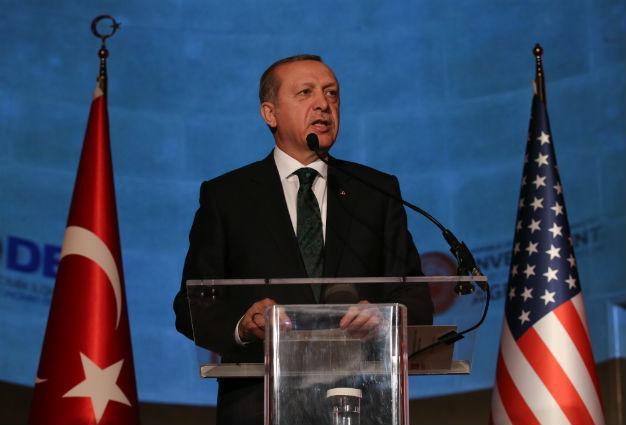Anti-terror fight tops Erdoğan’s US agenda
Tolga Tanış – WASHINGTON

AA photo
The fight against terror will top Turkish President Recep Tayyip Erdoğan’s agenda during a continuing visit to Washington, where he held talks with U.S. Vice President Joe Biden and Secretary of State John Kerry before an anticipated informal meeting with President Barack Obama on April 1.
Erdoğan, who is in Washington to attend the Nuclear Security Summit on March 31 and April 1, is holding talks on the fight against terrorism, whether it be the U.S.-led coalition against the Islamic State of Iraq and the Levant (ISIL) in Syria and Iraq, or against the outlawed Kurdistan Workers’ Party (PKK).
At the meeting with Kerry on March 30, Syria and the anti-ISIL fight was high on the list of topics discussed.
“They [Kerry and Erdoğan] discussed ongoing efforts to secure a political transition in Syria,” read a statement issued by the U.S. State Department on March 30.
“They also assessed coalition efforts to degrade and defeat Daesh in Syria, reviewing the progress that has been made on the ground and discussing ways to strengthen our cooperation against this shared threat,” it said, using the Arabic acronym for ISIL.
Erdoğan, along with Foreign Minister Mevlüt Çavuşoğlu, Foreign Ministry Undersecretary Feridun Sinirlioğlu, Presidential Spokesperson İbrahim Kalın, National Intelligence Agency (MİT) head Hakan Fidan and Turkey’s envoy to Washington, Serdar Kılıç, held talks with Biden on March 31.
White House spokesman Josh Earnest told reporters on March 30 that Obama would hold informal talks with Erdoğan in Washington, while also dismissing suggestions that the lack of a formal meeting represented a snub to Ankara.
U.S. sources talking on condition of anonymity said Erdoğan’s informal meeting with Obama on April 1 on the sidelines of the nuclear summit would be longer than anticipated and that the U.S. State Department was preparing extensively for the meeting.
The two most important topics are expected to be Turkey’s border security with Syria and the People’s Protection Units’ (YPG), the military wing of the Democratic Union Party (PYD), advance against ISIL in Syria, sources said.
The topic which the sides cannot reach a consensus on is the difference of designation of the YPG.
Turkey’s relations with the U.S. have been strained due to their differing stances regarding the PYD and YPG.
The U.S. sees the two organizations as “reliable” and important partners in its fight against ISIL in northern Syria and supplies them with military logistics. Turkey, however, says the PYD and YPG are terrorist organizations as they are the offshoots of the PKK, which the country has been in an armed conflict with since the mid-1980s.
Çavuşoğlu said March 30 that Turkey and the United States would “not fall out” over their differing stances on the PYD and YPG, adding that not all countries could be like-minded on every issue but this did not mean that the relations between the two NATO allies had deteriorated.
Deputy National Security Adviser for Strategic Communications Ben Rhodes said Turkey and the U.S. shared many interests and that “Turkey play an important role in the fight against ISIL.”
While acknowledging the difference in stances on the YPG issue, Rhodes said they understood Turkey’s anxiety over the PKK and its activities.
“What we told [the Turks] clearly is that we will take their concerns into consideration and will operate with [the Syrian Kurdish forces] very carefully,” said Rhodes during a teleconference for members of the press attending the summit.
Anti-terror was not the only topic on Erdoğan’s agenda.
Erdoğan said Turkish and U.S. business professionals needed to help expand trade between the two countries, while also calling on U.S. firms and Turkish entrepreneurs in the U.S. to come and invest in Turkey.
“I am inviting you from this platform to invest more in Turkey,” he said, noting Turkish entrepreneurs’ concerns about investing in the U.S. that are related to legislative differences, the competitive environment and geographical distance.
“I am calling on our entrepreneurs; think big, make firm plans for the middle and long run, establish partnerships with local firms and expand your commercial network to this side of the ocean,” he said. “Turkey will undoubtedly stand with you.”
Erdoğan also called on Jewish leaders in the U.S. to stand against Islamophobia, anti-Semitism and xenophobia.
“Unfortunately anti-Semitic, Islamophobic and xenophobic movements have moved from the periphery to the center of politics,” Erdoğan said March 30 at meeting with representatives of the Jewish organizations in the U.S., according to the state-run Anadolu Agency, as the meeting was closed to media.
“We need to cooperate against these movements,” he said.
